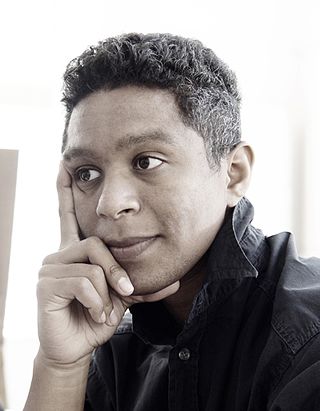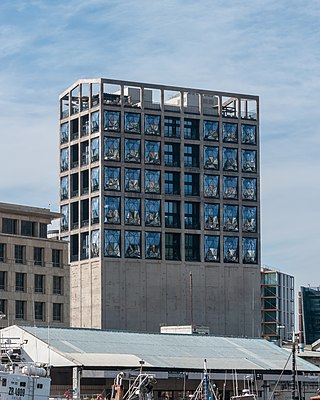Public art is art in any media whose form, function and meaning are created for the general public through a public process. It is a specific art genre with its own professional and critical discourse. Public art is visually and physically accessible to the public; it is installed in public space in both outdoor and indoor settings. Public art seeks to embody public or universal concepts rather than commercial, partisan, or personal concepts or interests. Notably, public art is also the direct or indirect product of a public process of creation, procurement, and/or maintenance.

Transmediale, stylised as transmediale, is an annual festival for art and digital culture in Berlin, usually held over three to five days at the end of January and the beginning of February. transmediale takes the form of a conference, an exhibition, and a film and video programme that often contain or support performances and workshops. Throughout the year, transmediale is also involved in a number of long- and short-term cooperative projects. From its initial focus on video culture, it came to cultivate an artistic and critical dialogue with television and multimedia, emerging as the leading international platform for media art.
Sean Slemon is a South African artist who works in sculpture, installation and printmaking. He lives and works in New York City.

Ishtiaq Ahmed Naseem is Software Engineer from Pakistan.
NewMusicSA is a non-profit arts advocacy organisation that promotes the creation, performance, and enjoyment of South African new music. Founded in 1999 and operating formally since 2003, NewMusicSA is the South African section of the International Society for Contemporary Music (ISCM).

Koestler Arts is a charity that helps ex-offenders, secure patients and detainees in the UK to express themselves creatively. It promotes the arts in prisons, secure hospitals, immigration centres and in the community, encouraging creativity and the acquisition of new skills as a means to rehabilitation. The Koestler Awards were founded in 1962 and the organisation became a charitable trust in 1969 following a bequest from the British-Hungarian author, Arthur Koestler.

a.a.s is a British art group that uses performance, installation, video, participatory art and Ritual in its practice.
The Africa Centre, in Cape Town, South Africa, is structured as a not-for-profit organisation whose purpose is to provide a platform for Pan-African arts and cultural practice to function as a catalyst for social change. All the projects it conducts, facilitates or supports have some social intention. These projects are supported by a variety of Pan-African artists.
Brett Bailey is a playwright, artist, designer, play director, festival curator and the artistic director of the group Third World Bun Fight. He was the curator of South Africa's only public arts festival, Infecting the City, in Cape Town, South Africa, from 2008 until 2011. His works have played across Europe, Australia and Africa, and have won several awards, including a gold medal for design at the Prague Quadrennial (2007).

Diana Page is a painter, performance and installation artist originally from South Africa but currently residing in Istanbul, Turkey. Exploring experiences of traveling back and forth between these two homes, Page's artwork concerns ideas of globalization and nomadic lifestyle. Through painting, drawing, performance, installation, and video, Page investigates the urban environments she inhabits as an emotional as well as physical setting.
Jay Pather is a South African curator, choreographer, and director working in Cape Town. He is the director of Siwela Sonke Dance Theatre and an associate professor at the University of Cape Town. Pather has been involved in the choreography and direction of over one hundred productions in South Africa and even more internationally.

Leán Coetzer is a South African dancer and choreographer. Her dance career officially began as founder member of the PACT Dance Company in 1988. Since then, Coetzer has performed and choreographed around South Africa, including the creation of several performance art pieces in various exhibitions and festivals. She works as a Voice Movement Therapy Practitioner.

Leila Anderson is a South African performance artist whose work balances the theatrical, the visual, and the performative. Her ongoing collaboration with Dutch artist Stan Wannet has produced several live installation works during the 2010s. She is a part-time lecturer in contemporary performance at the University of Cape Town.

Marco Cianfanelli is a South African artist who has been involved in a wide range of projects involving art, architecture and public spaces. Cianfanelli combines computer-generated, data-driven applications with human, expressive, gestural acts to create tension in his work. Cianfanelli is one of a handful of South African artists whose work successfully spans the public and domestic sphere. He began his career painting landscapes and continues to be concerned with romanticized space and that which is marginalized through the very act of romanticizing. Cianfanelli's slick, pared-down, iconographic recent works are intricately linked with the complexity of loving South Africa.

Mamela Nyamza is a dancer, teacher, choreographer, curator, director and activist in South Africa. She is trained in a variety of styles of dance including ballet, modern dance, African dance, the Horton technique, Spanish dance, jazz, movement and mime, flying low technique, release technique, gumboot dance and Butoh. Her style of dance and choreography blends aspects of traditional and contemporary dances. Nyamza has performed nationally and internationally. She has choreographed autobiographical, political, and social pieces both on her own and in collaboration with other artists. She draws inspiration from her daily life and her childhood growing up in Gugulethu, as well as her identity as a homosexual, Black, South African woman. She uses her platform to share some of the traumas faced by South African lesbians, such as corrective rape. Additionally, she has created various community outreach projects that have spread dance to different communities within South Africa, including the University of Stellenbosch's Project Move 1524, a group that uses dance therapy to educate on issues relating to HIV/AIDS, domestic violence and drug abuse.

Ashley Walters is a South African-born and based artist who works with photography and film.

Vleeshal Center for Contemporary Art organises exhibitions of contemporary art and an accompanying public program at Vleeshal in Middelburg, the Netherlands. Vleeshal resides in Middelburg's former town hall, on the market square. Characterized by its distinct Gothic architecture, Vleeshal is a unique space. The venue has inspired many artists to create extraordinary exhibitions, bringing Vleeshal international renown. Under the directorship of the current director Roos Gortzak, artists such as Cally Spooner, Ola Vasiljeva, Simone Forti, Andrea Éva Györi, Matthew Lutz-Kinoy and Paul Maheke have developed new works.

Magnet Theatre is an independent physical theatre company based in Cape Town, South Africa. It was formed in 1987 by Mark Fleishman and Jennie Reznek who have since been the company's artistic directors. Besides creating original theatre productions, Magnet Theatre is actively engaged in youth development work in the Cape Town area as well as in the Cederberg Municipality.

Zeitz Museum of Contemporary Art Africa is a public non-profit museum in Cape Town, South Africa. Zeitz MOCAA opened on September 22, 2017 as the largest museum of contemporary art from Africa and its diaspora. The museum is located in the Silo District at the Victoria & Alfred Waterfront in Cape Town. A retail and hospitality property, the Waterfront receives around 24 million local and international visitors per year.
Mmakgabo Mmapula Mmangankato Helen Sebidi is a South African artist born in Marapyane (Skilpadfontein) near Hammanskraal, Pretoria, who lives and works in Johannesburg. Sebidi's work has been represented in private and public collections, including at the National Museum of Women in the Arts, Washington and New York, the Smithsonian National Museum of African Art, New York, and the World Bank. Her work has been recognised internationally and locally. In 1989, she won the Standard Bank Young Artist award, becoming the first black woman to win the award. In 2004, President Thabo Mbeki awarded her the Order of Ikhamanga in Silver – which is the highest honor given to those considered a "national treasure". In 2011, she was awarded the Arts and Culture Trust (ACT) Lifetime Achievement Award for Visual Art, while in 2015 she received the Mbokodo Award. In September 2018, Sebidi was honoured with one of the first solo presentations at the Norval Foundation in Cape Town – a retrospective entitled Batlhaping Ba Re.
























